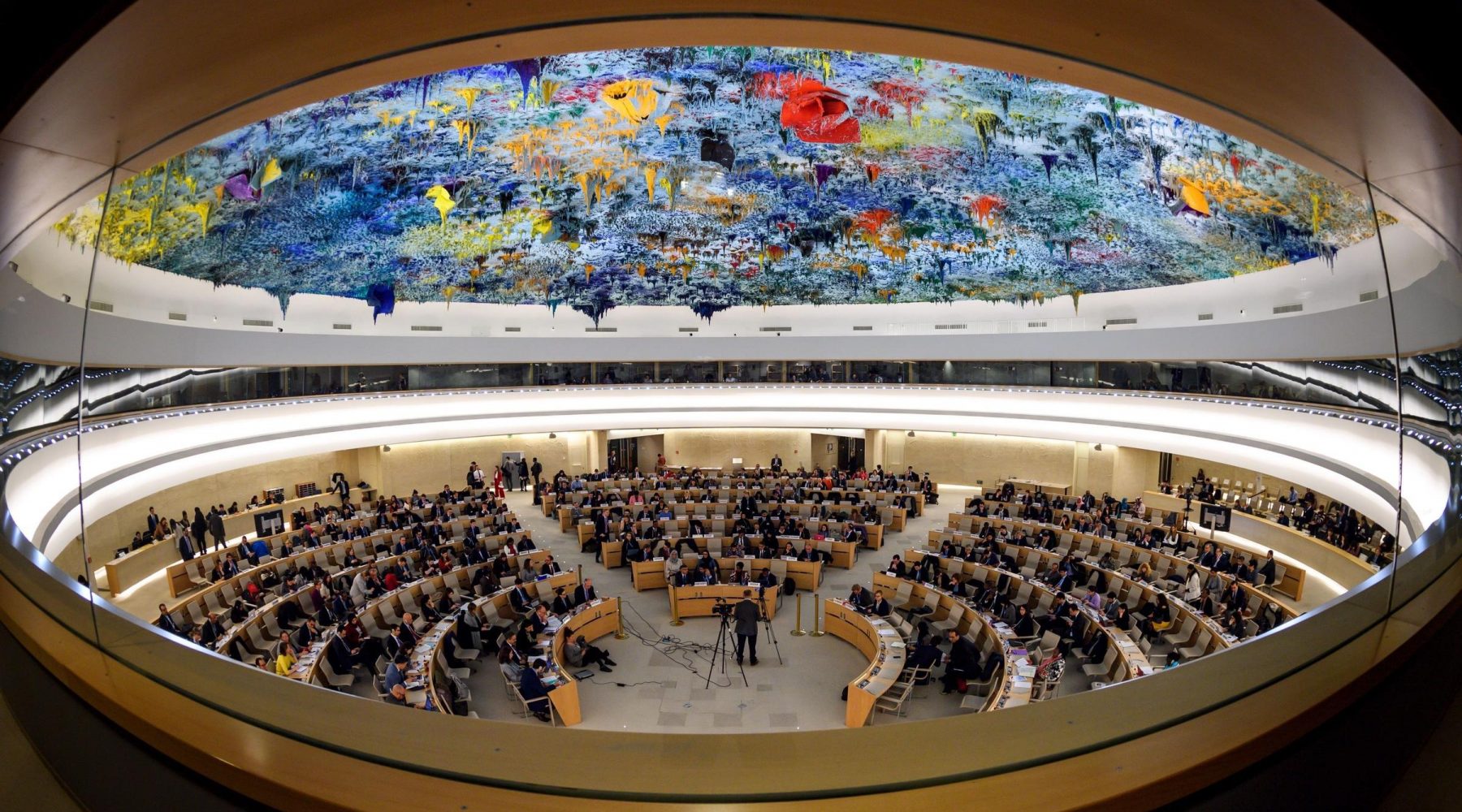


In its final statement at the 42nd session of the UN Human Rights Council, Humanists International has renewed its call for all states with blasphemy laws to abolish them.

Kacem El Ghazzali representing Humanists International
Speaking on behalf of Humanists International, Kacem El Ghazzali, a man who had to flee Morocco following “blasphemy” accusations, spoke about how anti-“blasphemy” laws create intolerance and exaggerate social tensions, as well as undermining freedom of belief and expression for the individual.
El Ghazzali said, “Blasphemy laws hinder and prevent religion from playing [a] positive role, in which instead of it being a factor in promoting tolerance and the values of equality and justice, it becomes a means of justifying the persecution of individuals and violating their basic human rights.”
He highlighted two recent cases:
For Humanists International, Kacem El Ghazzali said, “Blasphemy laws as these examples show, often target those peaceful humanists and activists who aspire to promote tolerance and combat discrimination in all its forms. Such laws target mainly the individual right to freedom of speech and thought.
“And we all know, that we cannot end discrimination based on religion if we do not guarantee freedom of speech as we cannot guarantee freedom of speech of we do not end blasphemy laws.”
The statement was delivered in Arabic. The full English and Arabic versions follow below:
42nd Session of the UN Human Rights Council (9th – 27th September 2019)
General Debate on Item 9
Kacem El GhazzaliThe Durban Declaration recognizes the role religion and belief can play in “the eradication of racism, racial discrimination, xenophobia and related intolerance.”
Unfortunately, Blasphemy laws hinder and prevent religion from playing this positive role, in which instead of it being a factor in promoting tolerance and the values of equality and justice, it becomes a means of justifying the persecution of individuals and violating their basic human rights, including, sometimes, the right to life.
For many years we have been campaigning for the abolition of blasphemy laws. We have also explained and demonstrated, be it here at this council or via our international campaign End Blasphemy Laws how governments and religious groups are using blasphemy laws as a tool of terror and persecution in order to immunize themselves from criticism and deny the individual liberties and freedom of speech to their citizens.
And because the time doesn’t allow us to highlight all the cases of those individuals who have been victims of blasphemy laws, we would like to draw your attention to the following recent cases:
About two weeks ago blogger Sherif Gaber was reported to have been sentenced to three years in prison for contempt of Islam and his support to LGBTI rights.
In Kuwait, the feminist activist Karima Karam has been a victim of numerous threats after she said in a that “she doesn’t want to be in a paradise that closes its door to her because she does not wear the hijab.” The Kuwaiti Interior Ministry accused Ms. Karam via a tweet of Infringement on the Divine Self and said also that the activist was referred for investigation.
Blasphemy laws as these examples show, often target those peaceful humanists and activists who aspire to promote tolerance and combat discrimination in all its forms. Such laws target mainly the individual right to freedom of speech and thought. And we all know, that we cannot end discrimination based on religion if we do not guarantee freedom of speech as we cannot guarantee freedom of speech if we do not end blasphemy laws.
Therefore, in line with their commitments under the Durban Declaration and Resolution 16/18, Humanists International urges the Council to condemn the use of blasphemy laws, and for those members with them to repeal them with urgency.
Therefore, in line with their commitments under the Durban Declaration and Resolution 16/18, Humanists International urges the Council to condemn the use blasphemy laws, with particular sensitivity towards feminists, secular Muslims, bloggers and dissenters, and for those members with such laws to repeal them with urgency.
الدورة الثانية والأربعون لمجلس حقوق الإنسان التابع للأمم المتحدة (9-27 أيلول / سبتمبر 2019)
النقاش العام حول البند 9
قاسم الغزالي
“.يقر إعلان ديربان بالدور الذي يمكن أن يؤديه الدين والمعتقد في “القضاء على العنصرية وما يتصل بذلك من تعصب
للأسف تعيق قوانين التجديف الدين من أداء هذا الدور ، بحيث بدلاً من أن يكون عاملاً في تعزيز التسامح ، يصبح بسبب قوانين التجديف وسيلة لتبرير اضطهاد الأفراد وانتهاك حقوقهم الأساسية ، وفي بعض الأحيان مصادرة حقهم في الحياة
لسنوات عديدة ونحن نقود حملات دولية لإلغاء قوانين التجديف. وقد سبق وأظهرنا، سواء كان ذلك من داخل أروقة هذا المجلس أو من خلال حملتنا الدولية “انهوا قوانين التجديف” ، كيف تستخدم الحكومات قوانين ازدراء الدين كأداة للإرهاب والاضطهاد من أجل تحصين نفسها من النقد
ولضيق الوقت، نود أن نلفت انتباهكم فقط للحالات الأخيرة التالية:
منذ حوالي أسبوعين بمصر ، تداولت وسائل الأعلام أن المدون شريف جابر حُكم عليه بالسجن لمدة ثلاث سنوات. بسبب ازدراء الإسلام ودعمه لحقوق المثليين
أما في الكويت ، كانت الناشطة النسوية كريمة كرم ضحية لتهديدات عديدة بعد أن قالت “أنها لا تريد أن تكون في جنة ترفضها لأنها لا تلبس الحجاب”. وزارة الداخلية الكويتية اتهمت السيدة كرم بالتعدي على الذات الإلهية وأحالتها على للتحقيق
إن قوانين التجديف ، كما تظهر هذه الأمثلة ، تستهدف أساسا المفكرين الأحرار والناشطين الذين يطمحون إلى تعزيز التسامح ومكافحة التمييز بجميع أشكاله. فهي تستهدف الحق في حرية التعبير والفكر. ونعلم جميعًا أنه لا يمكننا إنهاء التمييز على أساس الدين إذا لم نضمن حرية التعبير، كما لايمكننا ضمان حرية التعبير الا بانهاء قوانين التجديف
وبالتالي ،بموجب إعلان ديربان والقرار 16/18 ، تحث منظمة Humanists International المجلس على إدانة استخدام قوانين التجديف ، التي باتت تستهدف بالأساس النسويات والمسلمين العلمانيين المعارضين ، أم الدول الاعضاء فنطالبها بألحاح بالغاء هذه القوانين